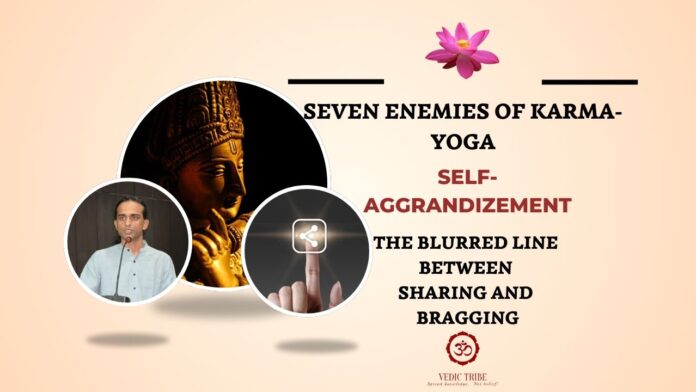The Blurred Line Between Sharing and Bragging:
In the previous article, we discussed “compensation effect” as an enemy of Karma Yoga and in this article we will discuss another enemy “Self-aggrandizement”.
Self-aggrandizement, the act of exaggerating one’s achievements or importance, can be a subtle yet insidious obstacle on the path of karma yoga.
True Karma Yoga emphasizes selfless service with an intention that transcends personal recognition, preventing ego from clouding the divine purpose. Hence, in Karma Yoga, selfless service should be performed with utmost subtlety to avoid fuelling ego. However, social pressure can subtly tempt a Karma Yogi to boast about their practices, seeking external validation.
A heart’s desire to share:
Sharing experiences and achievements with loved ones can be a healthy form of social interaction.
However, the line between genuine sharing and self-aggrandizement can be blurred. When the primary motivation shifts from authentic connection to seeking external validation or admiration, it crosses into the realm of bragging.
The Impact of Self-Aggrandizement:
This inflated sense of self leads to judgmental attitudes towards others, creating divisions and hindering the cultivation of compassion. Remember – without compassion, there is no Karma-Yoga. Spiritual practice aims to transcend the ego, but self-aggrandizement strengthens it. This creates a cycle of self-reinforcement, preventing true transformation.
Inflated Ego: Constant self-promotion can inflate one’s ego, leading to feelings of superiority and a sense of entitlement.
Distorted Self-Image: This inflated self-image creates an illusion of self-worth that is not grounded in reality.
Rajasic Influence: Self-aggrandizement fuels rajasic guna, a state characterized by passion, desire, and a thirst for external validation. This can hinder spiritual growth by fostering attachment to worldly desires and obstructing the path of detachment.
One must remember that self-aggrandizement can lead to spiritual narcissism, where spiritual practices are used to inflate the ego rather than to cultivate inner peace and compassion. One must also remember that authentic spiritual practice requires vulnerability and openness, qualities that are incompatible with egotism.
Overcoming Self-Aggrandizement:
Reduce Verbal Output: Consciously reducing the volume of one’s speech can increase self-awareness and encourage more mindful communication.
Practice Silence: Regular periods of silence, such as a monthly vow of silence, can help to quiet the mind and cultivate inner peace.
Focus on Listening: Shift the focus from speaking to listening. Pay attention to others and cultivate genuine interest in their experiences.
Practice Humility: Cultivate a sense of humility by acknowledging one’s limitations and recognizing the contributions of others.
By cultivating these practices, individuals can overcome the subtle yet insidious influence of self-aggrandizement and cultivate a more authentic and fulfilling spiritual journey.
The Vedic Tribe is happy to have brought you these seven enemies of Karmayogi; ie., factors affecting equanimity of mind. Our intention is to equip you to walk the path of Karmayoga without any deterrents.
All the best.
Madhwesh K
Vedic Tribe

